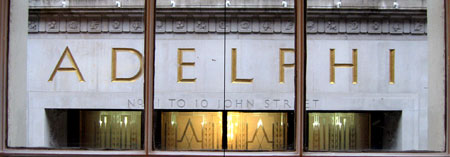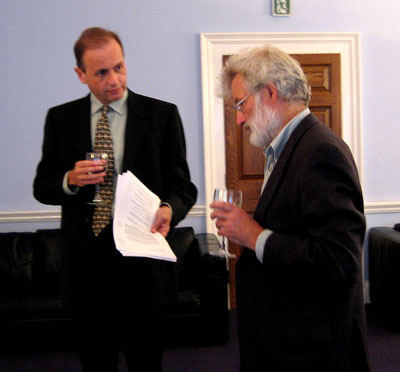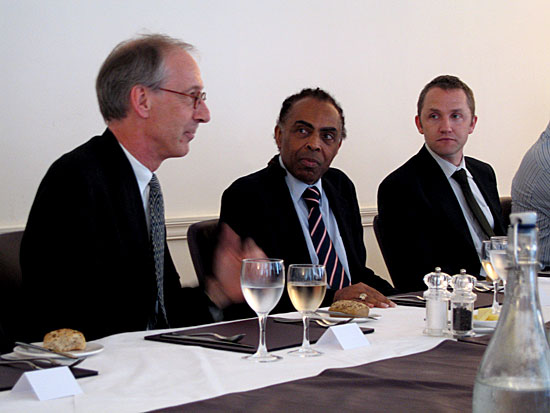
Here’s a neat idea — the text of the Bill of Rights gradually disappears as the mug is filled with hot liquid! Simulates the effect of a Bush presidency. Thanks to Boing Boing for the link.


Here’s a neat idea — the text of the Bill of Rights gradually disappears as the mug is filled with hot liquid! Simulates the effect of a Bush presidency. Thanks to Boing Boing for the link.
Just brooding on the way terminology can be used to ‘frame’ a discussion, and the phrase ‘Digital Rights Management’ came to mind. It should, of course, be called Digital Restrictions Management, which is the term I will use from now on.
Amidst the hoo-hah over the video iPod, two interesting developments have been overlooked. Both concern the new iMac G5 range. The machine now comes with an iSight video camera built in. And it ships without a modem (an external modem is available as a high-priced optional extra). What this tells us is that Apple is now assuming that the majority of its customers have broadband connections.
No — it’s not my headline, but one from John Dvorak, a prominent technology commentator. He’s been musing about the significance of a change in the way Microsoft approaches the provision of ‘patches’ to its flaky software. Sample:
Does Microsoft think it is going to get away with charging real money for any sort of add-on, service, or new product that protects clients against flaws in its own operating system? Does the existence of this not constitute an incredible conflict of interest? Why improve the base code when you can sell “protection”?
So what is actually going on here? I think there were some bottom-line questions that must have been brought up internally. Obviously someone at Microsoft looked at the expense of “patch Tuesday” and asked, “Is there any way we can make some money with all these patches?” The answer was “Yeah, let’s stop doing them and sell ‘protection’ instead.” Bravo! And now the company has a new revenue stream.
Very thoughtful post by Ed Felten rehearsing the arguments for and against P2P vs. centralised architectures. Note that copyright infringement is only a minor issue here.
From this week’s Economist…
Sales of music CDs and other physical formats fell by 6.3% in the first half of 2005. But sales of digital music (not shown in the chart) more than tripled to $790m. Music downloads and mobile-phone ringtones now account for 6% of retail revenues. Of the countries with the most music sales, the British bought the most per person, thanks to their attractive specialist music shops, and the release of Coldplay’s album “X&Y”.

If you’re a Mac user running OS X 10.4 (‘Tiger’), then this is something you simply must have.
As an experiment, I’ve signed up with the Google Adsense system. Under this scheme, Google monitors the content of the Blog and places relevant ads in the sidebar. (You can see them if you scroll down a bit.) If a reader clicks on one of these paid-for links, Google pays me a small sum. (If I click on one of the ads myself, Google kicks me out of the system btw. Hmmm… I wonder what happens if I go to Memex from a public workstation and click on the ads from there?)
But I digress… I’ve signed up not in the hope of getting rich, but to explore the hypothesis that Adsense could provide a revenue model for supporting Blogging. The idea is that if you have a popular blog which attracts lots of readers, then you might be able to earn enough from Google to at least pay your web-hosting bills.
Well, maybe you could. But the more interesting question is whether signing up to Adsense would undermine the credibility — or integrity — of your blog. And already I’ve made an intriguing discovery. The first item I posted after signing up was the report below about the launch of the Adelphi Charter — which is all to do with reversing the commercial world’s current mania for stronger IP rights. And guess what the first two ads placed by Google were? One for an outfit called “The UK Copyright Service” (motto: “protect your work internationally — fast and secure registration service”); the other an ad for a trademark registration service!
I will persist with this for a few weeks to see how it goes, but the omens are not promising.

One of the projects I’ve been working on for a while came to fruition last night with the launch of the Adelphi Charter. Or, to give it its full name, the Adelphi Charter on Creativity, Innovation and Intellectual Property. It’s an attempt for formulate a sane set of principles to guide law-making on IP in a digital age, and the project was hosted and sponsored by the Royal Society of Arts, which has a 200-year record of concern about intellectual property issues. I was a member of the international Commission which drafted the document.

The Charter was launched at a crowded event at the RSA, during which two of my fellow Commission members, James Boyle (on the left) and John Sulston, gave memorable speeches.
John led the team which decoded the human genome in order to ensure that it remained in the public domain, and in the process put the whole of humanity in his debt (a debt only partly repaid by his being awarded the 2002 Nobel Prize for medicine). At one point in his talk, he invited us to contemplate what would have happened if he’d failed — if the genome (which, after all, is “the book of life”) had been copyrighted by a commercial company. Anyone who wanted to read the book would, firstly, have had to pay a fee, and secondly (and more importantly) would not be able to reveal what they’d discovered as a result of reading it. It would, he said be “like reading a book review and going to a bookshop to buy a copy and being told by the bookseller ‘No — you can’t see it'”.
In his opening declaration, John Howkins, who chaired the Commission, reminded people that the publication of the Charter was, in a way, only the end of the beginning. The real work lies ahead — in persuading governments and the public that we have to think again about the way we grant and regulate intellectual property rights.
Being a member of the Commission has been an exhilarating experience because it brought me into contact with such a range of formidable people — ranging from thinkers like James Boyle, John Sulston, Larry Lessig and Jamie Love, to activists like Cory Doctorow and artists like Gilberto Gil, the remarkable musician who is also Brazil’s Minister of Culture.

Gilberto could not be present at the launch (he was in Paris on government business), but on Tuesday he came to the RSA for lunch — as did James Purnell, the UK ‘Minister for the Creative Industries’ (shown here on the right of the picture. John Howkins is on the left.)
Media reaction:

The sky over my house last evening.